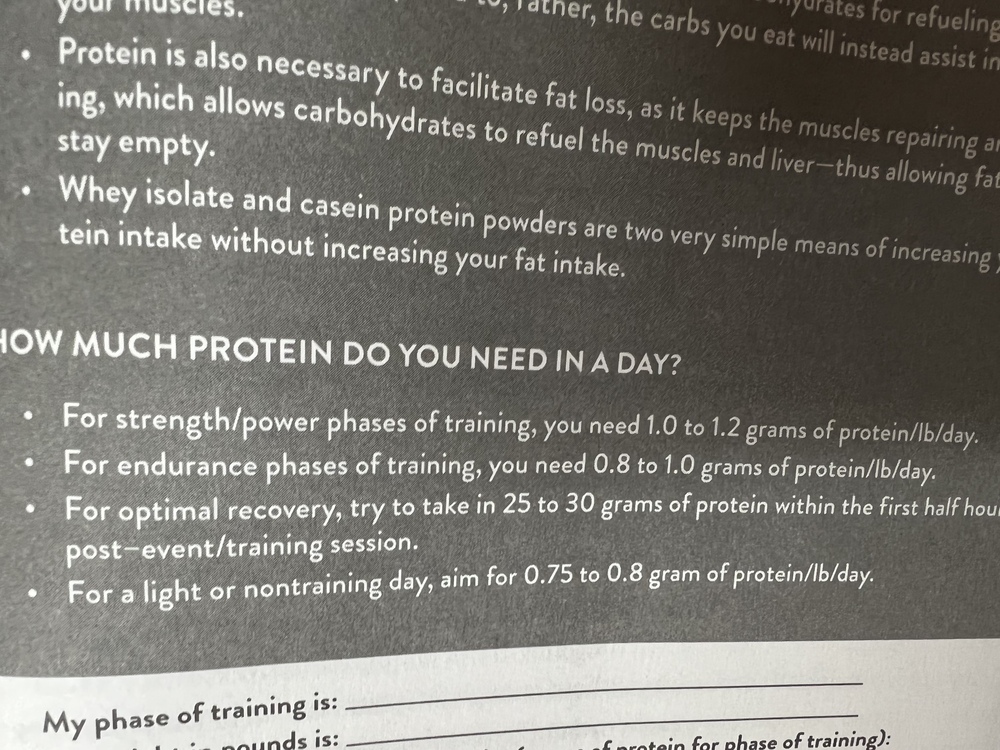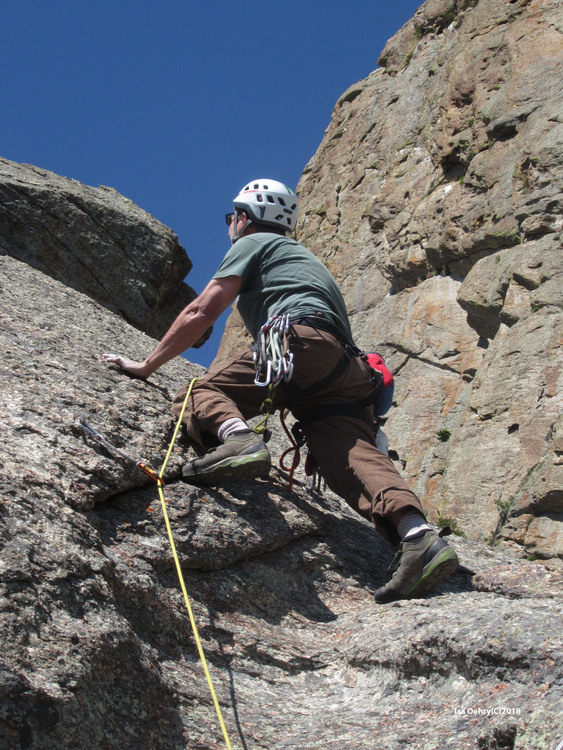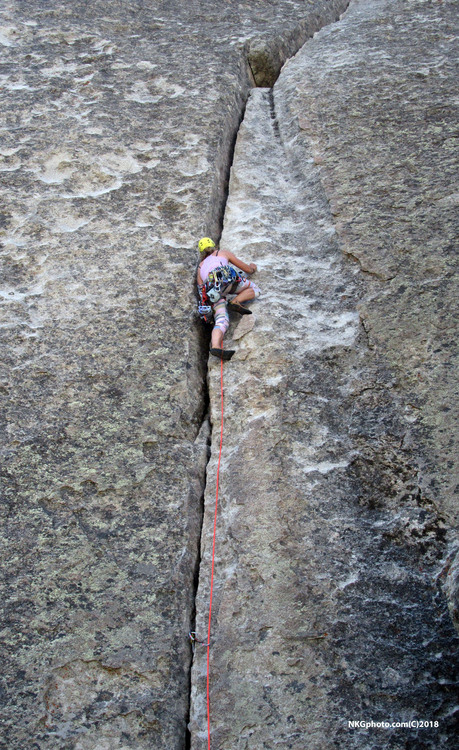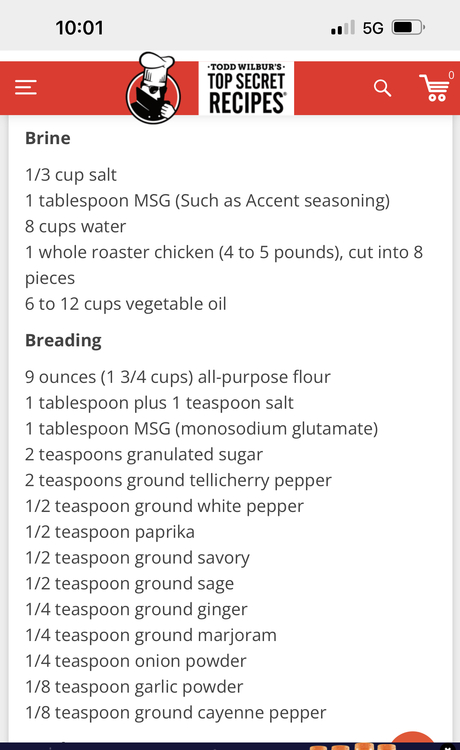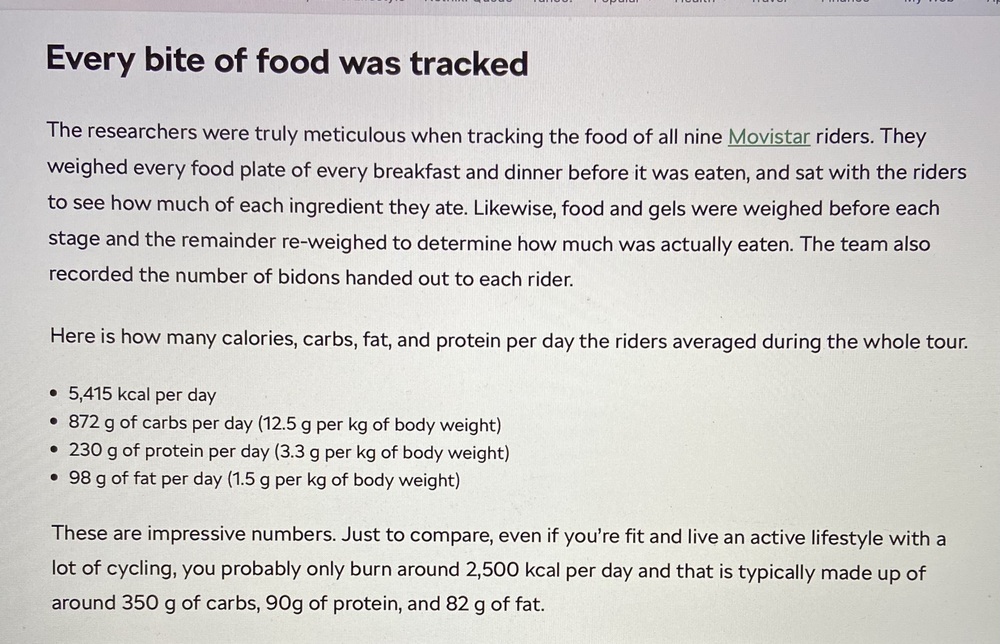New and Experienced climbers over 50 #23
|
|
phylp phylpwrote: It would be ineresting but there will be variations among people. Please post up when you have her numbers. |
|
|
Lori Milaswrote: From the American College of Sports Medicine - "To increase muscle mass in combination with physical activity, it is recommended that a person that lifts weights regularly or is training for a running or cycling event eat a range of 1.2-1.7 grams of protein per kilogram of body weight per day, or 0.5 to 0.8 grams per pound of body weight." I have also read that many people over the age of 65 have a decreased responsiveness to protein intake, leading some researchers to suggest that older active folks need even more than the above ACSM recommendations. And like you say you have to have enough total calories to support your activity level. So enjoy your cheesecake with a protein shake :) |
|
|
Bonus points for naming the 76yr old in the blue shit soloing the pitch I just led.. more 5.6/7 in COR I swear that place is made for old people! |
|
|
In regards to the protein discussion, o honestly think the silly author has mixed up kilos with pounds. Everything I read says max protein intake to be about 2g per kilo (for a body builder for instance) 2g per pound would of course be about double that amount. It’d be wry hard to do without supplements and you’d be flushing most down the toilet. Considering I don’t measure any food intake and that climbing is my only form of exercise I don’t look too scrawny (yet). |
|
|
Donini? |
|
|
Alan. Of course.. |
|
|
Russ Wallingwrote: Yeah, good point. Not an easy one to hear, but I will try to take it to heart. Cheers, GO |
|
|
Mike Kwrote: Thank you, Mike.... and thank you, Phylp. What caught my attention several years ago were some studies that said that people over 65 suddenly have increased protein needs in order to maintain muscle mass and endocrine health. Like, overnight? I would have thought older people need less, not more protein. Dr. Stacy Sims has published research on menopausal women, and their/our protein and fueling needs on into old age. Seems to be 'more', along with 'lift heavy shit'. Food and strength training. A lot of the actual research is on her website where she focuses on women's needs per stages of life, so there is good info on women over 50. When sharing my story here I always hope some lurker might be also looking for answers. This whole subject could well go under a separate thread. I know that we fall into two camps... those with effortless good health who never had to consider the particulars of aging and nutrition, and those who are struggling (hard). Maybe a third camp, if we could include my best friend, 'don't know, don't care'... we talk every day and usually she's on her way to Jack In The Box for a burger/fries... at this moment she holds a full-time job, which I couldn't do. So... All I know is, 'for me', I've had to manufacture a plan. Especially this year, I have no idea still what took me out but it's a long recovery, with greatly reduced appetite, weight loss, no intuitive sense of hunger or what I need to eat... at least for now I'm measuring, I'm documenting. I'm noting things like 40 grams of protein did not cut it on a climbing day. Note to self: add a protein shake next time. Another interesting thing: a protein shake before bed (especially if it's whey-based) 'is particularly effective at boosting protein synthesis'. (From Play On) |
|
|
I made it through a 12 year career of motocross & desert racing (one of the most physically demanding sports) with much less protein per day per pound than what you are talking about. You need a well balanced diet with lots of greens & other colored foods. My first wife was a vegetarian & I ate almost no meat. I would not eat meat 24 hours before a race because it would sit in my gut like lead. The minerals you get from a well balanced diet are very important - far more important than a lot of protein. Whey is designed to take a calf from 100 lbs. to 1000 lbs in a year. I can't think of a worse thing to do to your digestive tract at our age. Considering all the pounding my body took my joints are in very good condition. My only real problems are from one high speed road racing crash where I was hit by two bikes while tumbling down the track. Minor fractures in L5, L4, & L3 vertebrae, dislocated left hip & left knee, & dislocated right shoulder, both hands ground up. Of all that the left hip & right shoulder are the only real lasting problems. And they did not really both me till I was over 50. Because of my contract, I was on a bike less than 30 days after that crash. I raced for three years after that. |
|
|
Two camps, maybe three? "Those with effortless good health" or "those who are struggling hard." I don't think so. There is a long continuum of quality of health in individuals that I've been aware of, ranging from those who had to quit climbing in their late twenties due to some chronic problems and some folks I've heard of that are in their seventies (or older) and still cranking hard, with every imaginable step in between. Trying to pigeon-hole everyone into two or three categories seems like a big mistake. |
|
|
I’ve been craving KFC chicken and we have a KFC up here but I can guarantee it is not gluten-free and so it’s off-limits to me. But guess what? I think these recipes come pretty darn close. I have a package of organic chicken thighs and can certainly put all these ingredients together. I haven’t figured out the chicken gravy yet but I’m sure there’s something I can come up with.
Maybe I have just been forced to learn some empathy. Virtually everything I ever rolled my eyes at or scoffed at in earlier years is something I have had to deal with later in life. This morning was one of the worst mornings I’ve had in months and I have 1 foot in Tony’s world which says to ignore, ignore and pretend everything is fine. I have the other foot in my world that says I would love to have some answers. What’s difficult in dealing with Tony as we are built so differently and he’s better at denial. So when he says “look at me I got up and went to the gym and I’m not feeling great!“ I say “I agree Tony! So put on your running shoes and let’s go out for a jog together. I mean, you look good to me so what’s the problem?.” But I am haunted by the Lyme tests I had in 2009 and again a few months ago that I just don’t want to acknowledge. I mean there’s nothing I could do about that anyway so just carry-on. |
|
|
Brandt Allenwrote: Agree. I was never an elite athlete, but I spent many years climbing, backcountry skiing and telying, bicycling, and hiking without ever taking protein powders or protein drinks. I've always been negligent about green veggies, legumes, and grains and love butterfat (one PCP worried constantly about my cholesterol) and sweets (present PCP nags about my glucose level). I'm more concerned about losing weight and becoming frail. I don't do the outdoor sports anymore, though I hope to resume walking and hiking if I can ever get the @#$% orthopod's office to schedule my @#$% back procedure. Yet, for all my bad eating habits, I'm still climbing pretty much as hard as I ever did (intermediate level) at the gym several days a week. I think it's pretty much a case of YMMV. Edit to add that I've been lucky to avoid things like lyme disease. |
|
|
Mark Frumkinwrote: Back in the day (1980 or so) I was contracted to the European Yamaha importer (Mitsui) as their big-bore enduro rider and once a year we had a two week training camp in Holland where they dragged all their Euro riders over for fitness assesment and training plans etc. The trainer was some California guy with all that sport science stuff (trained Brock Glover) and it was kinda cool, my buddy there was Haken Carlqvist who was already world 250 MX champion and came to Yamaha to ride 500 class and we'd listen to all this diet stuff then go out to eat steak and fries washed down with a lot of beer. If you have not much skill then you need a lot of bulk to keep the big strokers going fast. Hakens greatest moment (apart from winning the '83 championship) was leading the '88 round at Namur by so much he stopped and drank a beer before continuing on to win. Whatever works is good. |
|
|
Interesting discussion around protein. Ultimately you have to do the n=1 experiment on yourself but be aware of the likelihood of placebo responses. I think I may have said before I'm not a nutritionist but I do health research and I'm pretty suspicious of a lot of nutritional research much of which is at high risk of bias. Much of the nutrition research is industry supported. Whey of course is a by-product of cheese production and would be thrown away had the body dysmorphia industry not created a multibillion dollar market for it. Dr Simms is an active researcher in the field, not just as salesperson, which is a strong point in her favour however. Even taking into account the (theorised?) lower protein absorption in older women the g/pound/day intake suggested does seem very high. My understanding was that for hard endurance training 1.2-1.4 g/kg/day is needed. For resistance athletes the consensus seems to be that requirements might be as high has 1.6-1.7 g/kg/day during a hypotrophy phase. (0.9 g/kg/day is recommended for maintaining mass.) These are values for elite athletes and bodybuilders, none of us are operating remotely at that level. If I were to have an extra source of protein late at night, personal ethics allowing, I'd make it a chunk of meat which will be more slowly metabolised than whey. Much like Spanish climbers do! |
|
|
A well balanced diet of healthy foods, rather than looking for a silver bullet, by going from one fad diet to another, seems the best approach. There is no silver bullet, only minor tweeks. Genetics and luck are not in our control, but diet (and activity) can be. |
|
|
duncan...wrote: Yeah, there certainly is a lot of n=1 aspect to this. I just figured out a long time ago that I personally do better with a high veggie, higher proportion from protein, healthy fats, lower carb diet. You have to remember that at 4 cals per gm for protein, 80-100 gm protein, which is what I typically have, is only 320-400 calories out of my daily 1200 (resting MR). Here is fun report from elite athletes. This data was collected from the Movistar team during the 2015 Vuelta D'Espania: Enough on this topic for me... On another note, the Canterbury Bells were in full bloom all around New Jack City on Saturday! We actually got too hot in the sun with air temps around 60, and I moved to a north face for my last three routes. By the third one, my hands were getting numb, but it was a good first day outside for 2023. Not many feet of climbing - the routes were all very short - but 8 routes, all new. |
|
|
There are definitely wide variations of what diet works for different people. My wife seems to be able to stay lean while still eating plenty of carbs. Not me. I’ve found that I’ve had to change my diet every 10 years or so since age 30, each time reducing my carbohydrate intake. Now I’m eating mainly keto with extra carbs on climbing/training days, especially like a banana with my protein shake immediately afterward. I also don’t eat after 5 PM or before 9 AM. |
|
|
phylp phylpwrote: Did they factor in the number of bidons that were handed out just so the DS could give the rider a boost up the road, and then promptly tossed aside after the rider was done with their tow? |
|
|
phylp phylpwrote: Speaking of elite athletes reminds me of this article that mentions grandmaster tournament chess players can use up to 6,000 calories per day: Robert Sapolsky, who studies stress in primates at Stanford University, says a chess player can burn up to 6,000 calories a day while playing in a tournament, three times what an average person consumes in a day. Based on breathing rates (which triple during competition), blood pressure (which elevates) and muscle contractions before, during and after major tournaments, Sapolsky suggests that grandmasters' stress responses to chess are on par with what elite athletes experience. "Grandmasters sustain elevated blood pressure for hours in the range found in competitive marathon runners," Sapolsky says. Also https://www.npr.org/2019/09/18/762046422/the-chess-grandmasters-diet |
|
|
csproulwrote:
Or, just to squirt on their head and back to cool down. Actually, I believe that in both of these cases, the bidons contain water rather than nutritional fluids. |

 Continue with onX Maps
Continue with onX Maps Sign in with Facebook
Sign in with Facebook




















